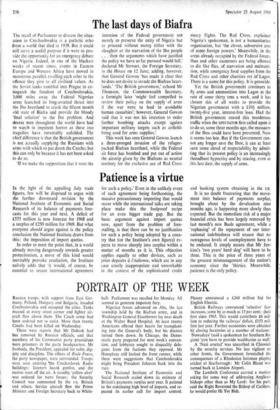The last days of Biafra
The recall of. Parliament to discuss the situa- ation in Czechoslovakia is a pathetic echo from a world that died in 1939. But it could still serve a useful purpose if it were to pro- vide the opportunity for an emergency debate on Nigeria. Indeed, in one of the blackest weeks of recent times, events in Eastern Europe and Western Africa have moved in monstrous parallel, rivalling each other in the offence they give to all civilised values. As the Soviet tanks rumbled into Prague to ex- tinguish the freedom of Czechoslovakia, 3,000 miles away the Federal Nigerian army launched its long-awaited thrust into the Ibo heartland to crush the fifteen month old state of Biafra and provide the bloody 'final solution' to the Ibo problem. And decent men throughout the world have had to watch in impotent horror as these two tragedies have inexorably unfolded. The chief difference is that the British government is not actually supplying the Russians with arms with which to put down the Czechs; but this can only be because it has not been asked to do so.
'If we make the supposition that it were the intention of the Federal government not merely to preserve the unity of Nigeria but to proceed without mercy either with the slaughter or the starvation of the Ibo people . . then the arguments which have justified the policy we have so far pursued would fall,' declared Mr Stewart, the Foreign Secretary, in the House on 12 June; adding, however, that General Gowon 'has made it clear that he does not desire to invade the Biafran heart- lands.' The British government,' echoed Mr Thomson, the Commonwealth Secretary, a fortnight later 'might feel compelled to review their policy on the supply of arms if the war were to lead to avoidable human casualties'; however, General Gowon said that it was not his intention to order further bombing attacks except against important military targets such as airfields being used for arms supplies.'
This week has seen General Gowon launch a three-pronged invasion of the refugee- packed Biafran heartland, while the Federal air force has bombed and put out of action the airstrip given by the Biafrans as neutral territory for the exclusive use of Red Cross mercy flights. The Red Cross, explained Nigeria's spokesman, is not a humanitarian organisation, but 'the clever, subversive arm of some foreign powers.' Meanwhile, in the areas already occupied by the Federal forces, Ibos and other easterners are being allowed to die like flies, of starvation and malnutri- tion, while emergency food supplies from the Red Cross and other charities rot in' Lagos. There is a name for this policy. It is genocide.
Yet the British government continues to fly arms and ammunition into Lagos at the rate of some thirty tons a week, and it has chosen this of all weeks to provide the Nigerian government with a floi million, twenty-five year, interest-free loan. Had the British government ceased this murderous traffic when the SPECTATOR first called upon it to do so, some three months ago, the massacre of the Ibos could have been prevented. Now it seems too late. But if the Government can- not any longer save the Ibos, it can at least save some shred of respectability by admit- ting that its present policy is an increasingly threadbare hypocrisy and by ceasing, even at this late date, the supply of arms.


































 Previous page
Previous page